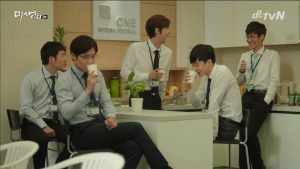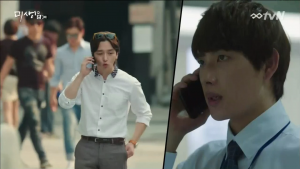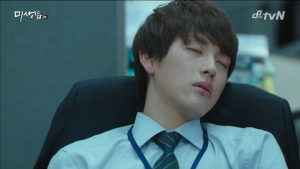Synopsis: Geu-rae and his team proceeds with their profitable but controversial project facing many obstacles.
When I first went to U.S. to learn English as a fifteen years old Korean exchange student, the American language or English culture shocked me. It has very limited formality. For example, not only there is no word for me to replace the Korean honorifics but also what English have for formality is very limited. For example, there are Mr., Ms. and Mrs. to address teachers in school. Considering where I went was Southern U.S. conservative Christian community, I was lucky and less confused to have sir and ma’am to address my betters. I felt very uncomfortable since my host father wanted me to address him as “Tim” not Mr. Thames. I had been raised to be respectful using proper honorifics and formal language by my parents. However, at the time, I could not help but feel that the language was limiting me to be the respectful person I had been raised to become.

Throughout episodes 12 and 13, I witnessed many cases of people being “chewed out” by their superiors. I agree that some “chewing out” could be considered acceptable since what is at stake for some people is their livelihood. For example, these people could lose their job should the project they are working on fails. However, I could not help but feel uncomfortable during some exchange of personal insults including calling whoever is younger and lower in position “saeki”. At this point, I must argue that even though such honorifics and formality I have been taught throughout my entire life make Korean conversations sound polite and respectful, they are also used to limit, put down and claim authority over younger generation especially when it comes to Korean office culture demonstrated in Misaeng.

According to Lee and Ramsey, “the most important determining factor in honorific usage is the age of the interactant, with other factors being social rank, solidarity and the context of the exchange” (as cited in Yoon 2005, 196). Furthermore, “people maintain and respect the notion that those of advanced age have a certain authority” mentions Yoon (2005, 196). Yoon finally claims that Koreans consider older people or noin as “not like me and as people above me” (2005, 199). In all cases, people scolding others at work are usually older and hold superior position in Misaeng. The older age combined with superior positions, the Drama depicts personal insults during scolding as common phenomenon in Korean office culture while people being scolded would normally and simply stand there and listen. Such verbal abuse is one-direction phenomenon as it only goes from the people with higher position to the lower position within the company. If the “scoldee” talk back, he/she would be ostracized because there is a continuing pressure for the younger generation to conform to social norms of respecting older people according to Brown (2011, 119). Especially since “Korean conceptualization of social relationships is hierarchical and vertical” according to Yoon (2005, 194), personal insults in the forms of verbal abuse only intensify in office culture where there is an additional hierarchical dynamics of positions. Although I agree that age and social positions should be respected to establish order as a Korean, I must argue that age and position do not enable anyone to verbally abuse others regardless of circumstances.

As I mentioned previously, younger generation in Korean office culture are often targeted for verbal abuse. I personally and strongly believe age and higher position in office culture does not prove anything for individuals. Such Korean culture of using honorifics and formality should never be assumed as an instrument to treat younger people without any respect. Regardless of age, all Korean generations should treat each other with respect being proud of politeness encrypted in their language.

Works Cited:
6. Brown, Lucien. “Korean Honorifics and ‘Revelaed’, ‘Ignored’ and ‘Suppressed’ Aspects of Korean Culture and Politeness,” in Korean Honorifics and Korean Culture. London: Palgrave Macmillan, 2011
Yoon, Kyung-Joo. “Not Just Words: Korean Social Models and the Use of Honorifics.” Intercultural Pragmatics 1, no. 2 (July 2005): 189-210. Accessed July 15, 2018.


